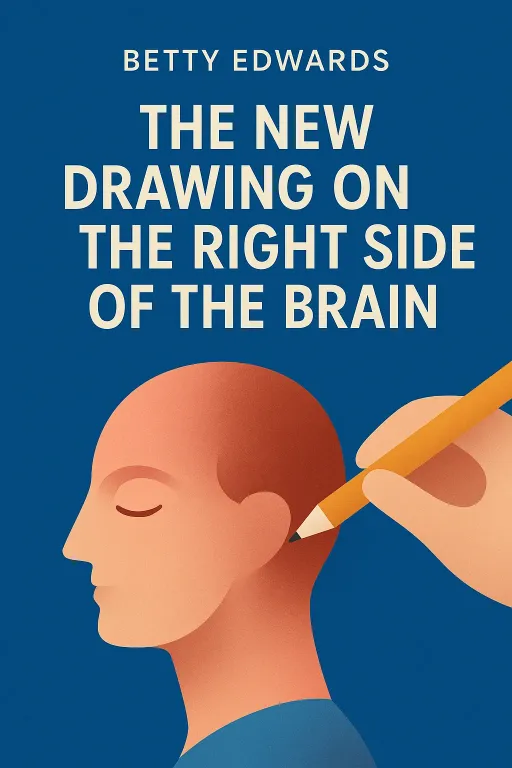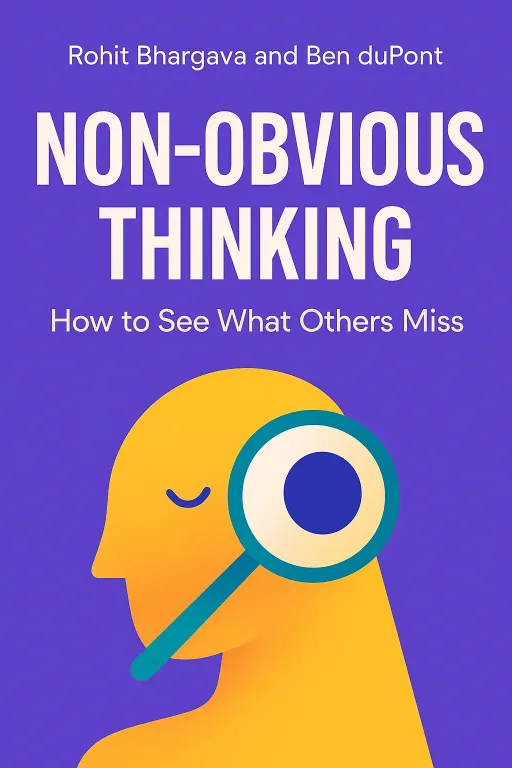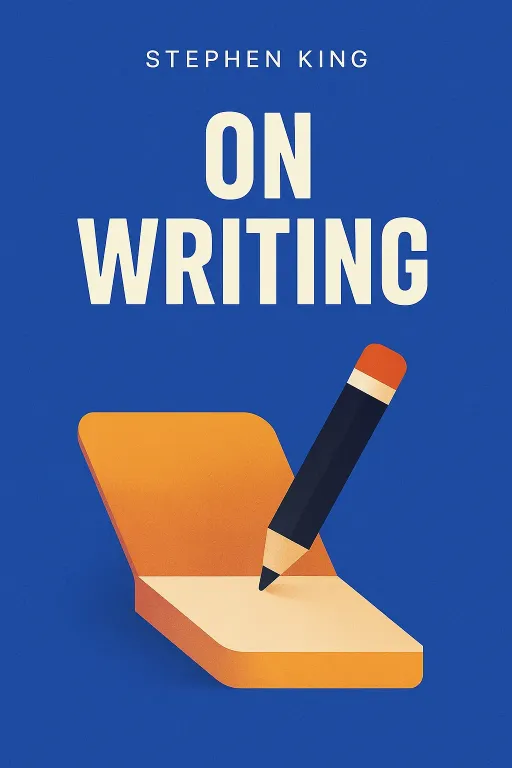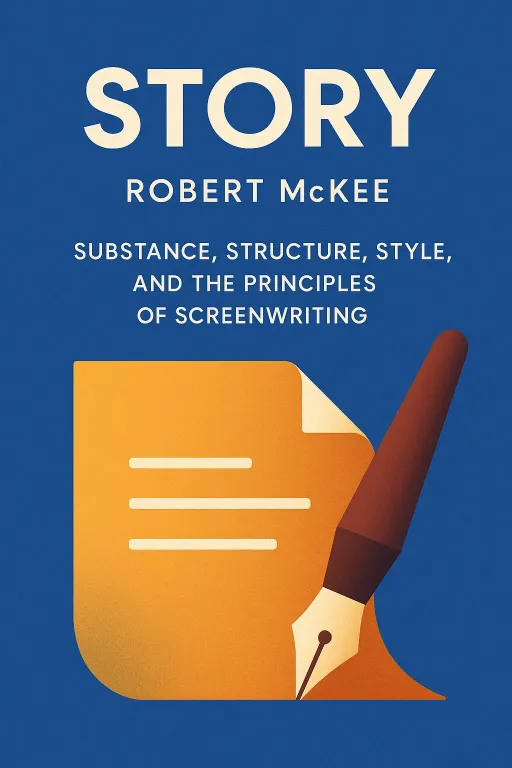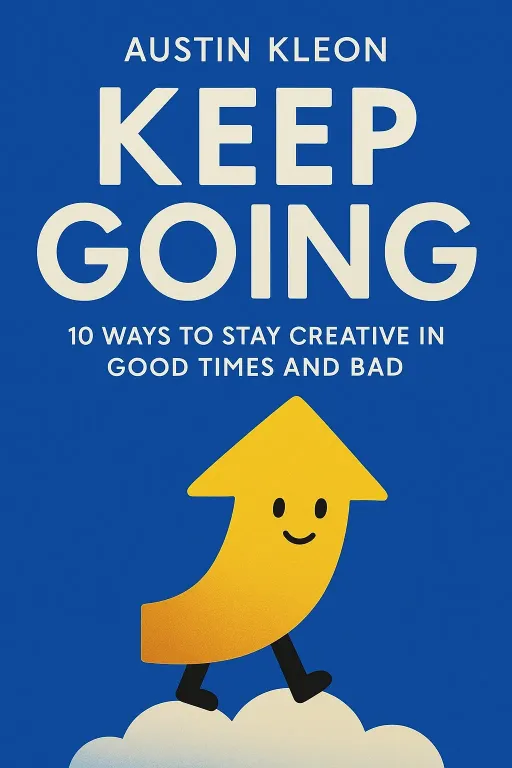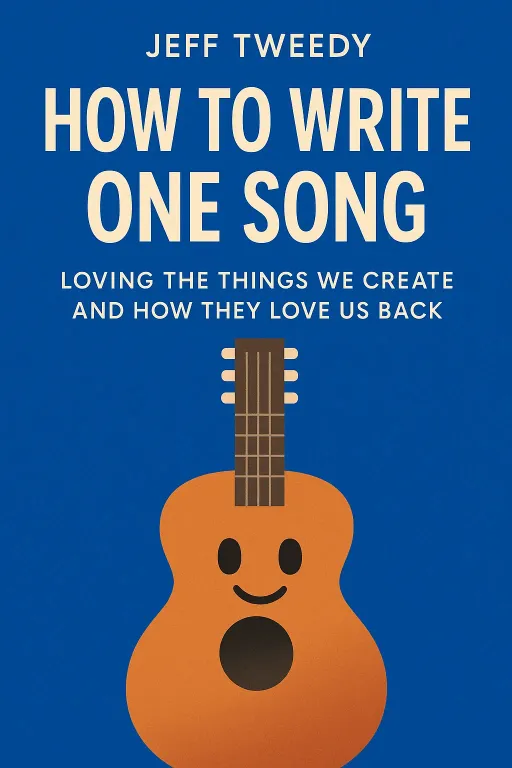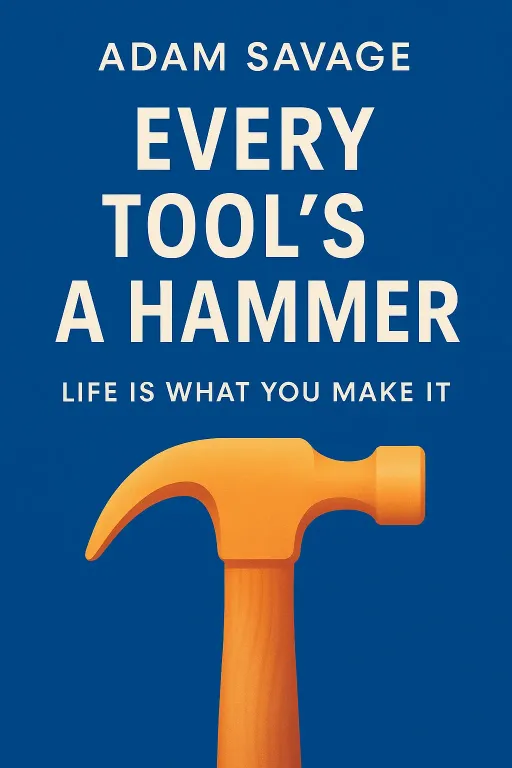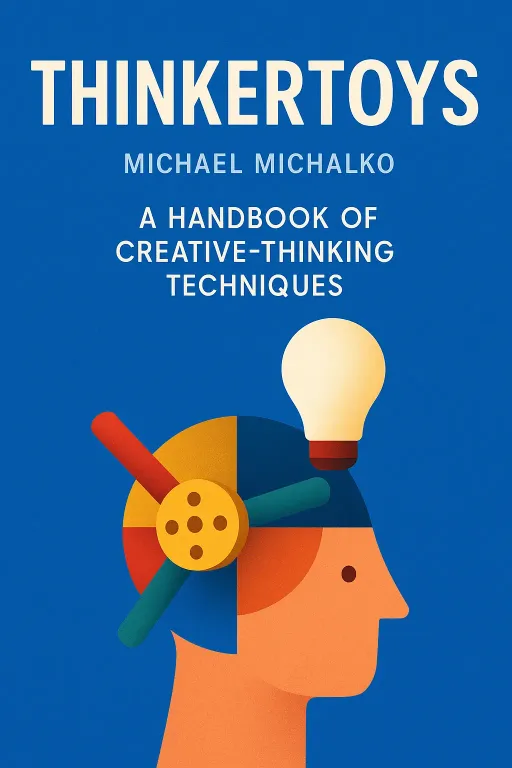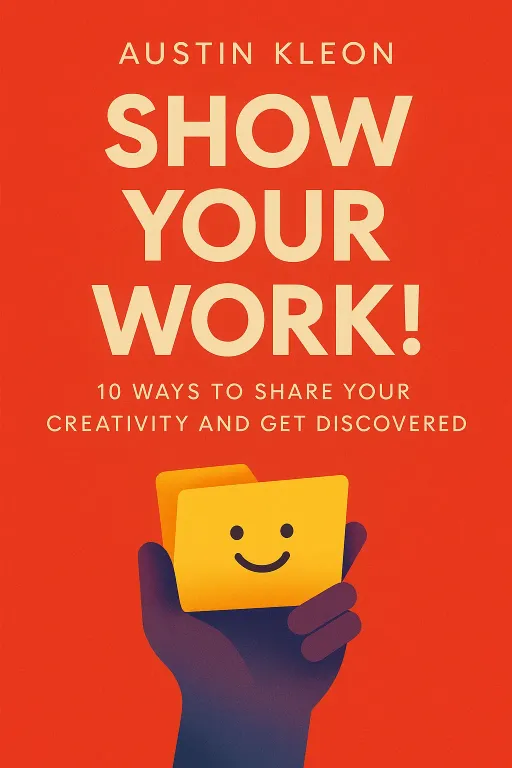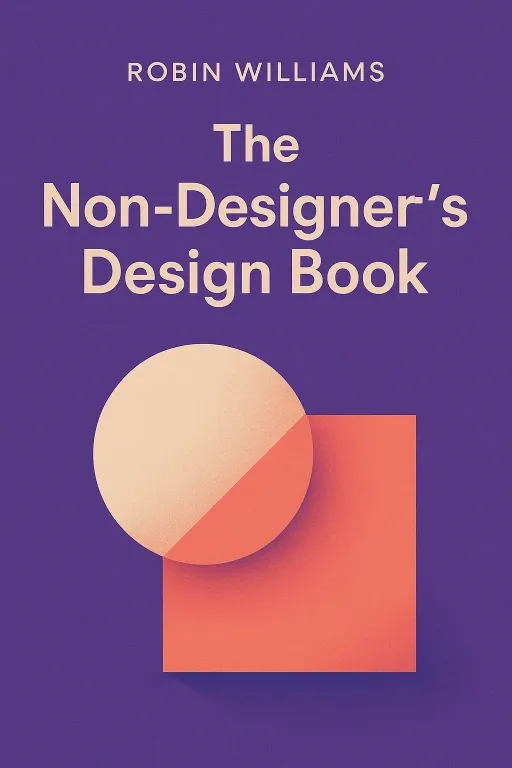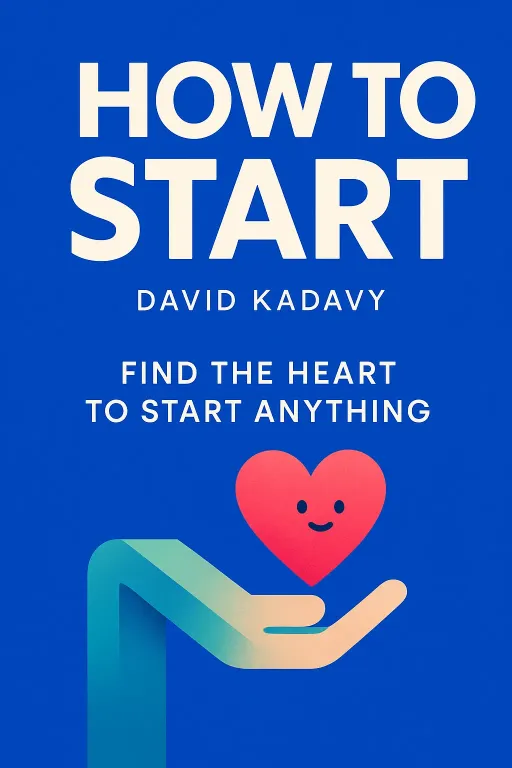
Trick Your Ego & Start
11 minGolden Hook & Introduction
SECTION
Rachel: The worst advice you can give a creative person is 'just get started.' Justine: Whoa, okay, that’s a hot take. That’s like the first page of every productivity book ever written. Rachel: I know! But it's not just unhelpful; it can be actively damaging. It’s like telling someone who’s afraid of heights to ‘just jump.’ It completely ignores the real problem. Justine: Okay, you have my full attention. I feel like I've been told 'just start' my whole life. If that's the wrong advice, what's the alternative? Rachel: Exactly! And that's the central question in David Kadavy's book, How to Start: Find the Heart to Start Anything. What's so compelling is that Kadavy himself wasn't a 'natural' writer. He was an award-winning designer, even advised a company that got acquired by Google, but he really struggled with the very creative resistance he writes about. His advice feels so battle-tested and authentic because he lived it. Justine: Ah, so he’s not just preaching from a mountaintop. He was in the trenches with the rest of us, staring at a blank page. Rachel: Precisely. And the reason that 'just start' advice fails is because it ignores the real battle, which isn't about a lack of ideas or skill. It's about a conflict happening inside our own minds.
The Inner War: Your Art vs. Your Ego
SECTION
Justine: An inner conflict? That sounds dramatic. What are we talking about here, a full-on psychological war? Rachel: In a way, yes. Kadavy frames it as a struggle between two parts of you: your 'Self' and your 'Ego.' The Self is that core part of you that has a unique voice, that wants to create, to express something that only you can. It’s what he calls your 'art.' Justine: I like that. Art isn't just painting or writing, it's whatever your unique contribution is. A business, a recipe, a podcast... Rachel: Exactly. But then there's the Ego. And the Ego's job is simple: protect you. It wants comfort, safety, and predictability. And your art—your true, unique expression—is none of those things. It’s risky. People might judge it. You might fail. Justine: So the Ego is like an overprotective parent who thinks your dream of being a rockstar is a terrible idea because you might get your feelings hurt. Rachel: A perfect analogy. Kadavy has this incredibly powerful story from when he was 25. He describes his life as completely 'beige.' He had a beige apartment, drove a beige car, and worked in a beige cubicle. On the outside, he was doing everything 'right'—good job, stable life. But inside, he felt this profound disconnect. He’d look in the mirror and not recognize the person staring back. That feeling of being trapped in a life that wasn't his? That was his Ego winning. Justine: Oh, that beige cubicle story hits hard. I think we've all had a version of that, where your life looks fine on paper but feels hollow. But why does the ego fight so hard against something that would ultimately make us happier? It seems self-defeating. Rachel: Because the ego isn't concerned with fulfillment; it's concerned with survival. It equates 'different' with 'dangerous.' Kadavy shares this incredible insight from Sean Stephenson, a therapist and motivational speaker who was born with brittle bone disorder. He was three feet tall, in a wheelchair, and had suffered hundreds of fractures. Justine: Wow. Rachel: Stephenson said he was bullied his whole life, but he realized something profound. He said, "I’ve never found a bully that was doing amazing things with their life." He argued that happy, successful, emotionally-balanced people don't have time to put others down. Bullying is an ego defense. It's insecure people trying to feel bigger by making someone else feel smaller. Justine: That makes so much sense. So our own inner critic, that voice that tells us our ideas are stupid or that we're not good enough... that's just our ego bullying us to keep us safe in our beige cubicle. Rachel: Exactly. The ego fears your art because if you actually pursue it, you will have to face discomfort. You'll face the possibility of rejection, of failure, of looking foolish. The ego’s logic is simple: if you never start, you can never fail. You can live forever with the comfortable delusion that you could have been a great writer, or artist, or entrepreneur. Justine: That is a chilling thought. The comfort of the what-if is actually a trap. Okay, so our ego is this hyper-vigilant bodyguard who's ruining our lives. How do we sneak past it?
Winning by Beginning: Practical Judo for the Mind
SECTION
Rachel: This is where the book gets so brilliant and practical. You don't fight the ego with brute force. You don't just yell "I'm going to do it anyway!" because the ego is stronger and smarter than that. You use what Kadavy calls 'Motivational Judo.' Justine: Motivational Judo. I love that. So you use the ego's own weight against it? Rachel: Precisely. You trick it. One of the ego's favorite tricks is what he calls the 'Fortress Fallacy.' This is when you get an idea, and you immediately imagine the biggest, most glorious, finished version of it. You don't think about writing a blog post; you think about writing a Pulitzer-winning novel. You don't think about starting a small business; you think about building a billion-dollar empire. Justine: Oh, I am so guilty of this. It's like wanting to run a marathon when you haven't even bought running shoes yet. And it's paralyzing, because the gap between where you are and that giant fortress is just too massive. Rachel: It's completely paralyzing! And it gives the ego the perfect excuse: "Well, you can't build a fortress today, you don't have the time or the skills. Let's just scroll on social media instead." To counter this, you have to think small. Absurdly small. The best story he uses is about the artist Hugh MacLeod. He was working in advertising, wanted to be a cartoonist, but felt overwhelmed. Justine: The Fortress Fallacy in action. Rachel: Totally. So one day, he forgot his sketchbook and just started doodling on the back of a business card he had in his pocket. And it was a revelation. A business card is tiny. It's low-stakes. You can't draw a masterpiece on it. It’s almost impossible to fail. His ego couldn't object. It was too small to be a threat. Justine: So you're not building a fortress, you're just doodling on a tiny card! That's brilliant because it's almost too small to fail. The commitment is so low, the ego just shrugs and says, "Fine, whatever." Rachel: And that's the judo move! Those business card cartoons became his signature style. He built a massive online following, got a book deal, and now his company, Gapingvoid, creates art for huge corporations. It all started because he chose a canvas so small it was laughable. Justine: That is incredible. It’s a real-life example of how a tiny start can lead to something huge. So what’s a practical way for the rest of us to apply this? Rachel: Kadavy shares his own technique, which I think is so useful. When he was writing his first book, he was completely blocked. So he made a deal with himself: he just had to write for ten minutes. He’d set a timer, and for those ten minutes, he had to write. No email, no phone, just writing. After ten minutes, he was free to do whatever he wanted. Justine: And let me guess, after ten minutes, he was in the flow and just kept going? Rachel: Almost every time. The ego can't argue with ten minutes. It's nothing. But that tiny, non-threatening start is enough to build momentum. The engine starts, and once it's running, it's much easier to keep it going. Justine: Okay, I love these strategies. But they all lead to one scary place: actually making the thing. What if you do your ten minutes, you draw on your business card, and the work just... sucks? Isn't that the ultimate fear the ego is trying to protect us from? The fear of being bad at it? Rachel: That is the final boss battle. And Kadavy's answer is simple, but profound: you have to give yourself 'Permission to Suck.' Justine: Permission to Suck. I need that on a t-shirt. Rachel: We all do! He quotes Ira Glass, the creator of 'This American Life,' who talks about this 'gap' that all creatives have. In the beginning, your taste is killer. You know what good work looks like. But your skills haven't caught up yet. So the stuff you make is, frankly, disappointing. It doesn't live up to your own standards. And most people quit right there. Justine: Because it's too painful to see that gap between what you want to create and what you're actually capable of creating. Rachel: Yes. But the only way to close that gap is to produce a huge volume of work. Ed Sheeran has a great analogy for this. He says songwriting is like turning on a dirty tap. At first, all this brown, sludgy water comes out. You have to let it run for a while, get all the gunk out, and eventually, the clean water starts to flow. Justine: So the 'bad' songs aren't a sign of failure, they're just the gunk you have to get through to get to the good stuff. Rachel: Exactly. You have to write the ninety-one pages of what Hemingway called 'shit' to get to the one page of masterpiece. The permission to suck isn't just a nice platitude; it's a mathematical necessity for creative work.
Synthesis & Takeaways
SECTION
Justine: It feels like the whole philosophy of this book is about being kind to yourself, but in a very strategic way. Rachel: That's a great way to put it. The whole journey isn't about becoming a disciplined, iron-willed machine. It's about becoming a clever psychologist of your own mind. You acknowledge the ego's fear, you understand its motives, but you don't let it drive the car. You use these small, almost playful tricks to gently nudge it aside. Justine: It’s about making the first step so ridiculously small that your ego literally can't be bothered to stop you. Like writing one sentence, or doodling on one business card, or setting a timer for just ten minutes. Rachel: And trusting that those tiny, imperfect starts are not just starts—they are everything. They are the seeds from which the entire forest grows. The book is really a powerful argument against perfectionism, showing that it’s not a high standard, but a high-level form of fear. Justine: It reframes the whole process. The goal isn't to create a masterpiece on day one. The goal is just to turn on the tap. Rachel: Exactly. So for everyone listening, here’s a thought to take with you. Think about that project you've been putting off, that 'fortress' in your mind. What is the smallest, most pathetic, least intimidating version of it you can imagine? What is your 'business card' version of that dream? Justine: Maybe it's not writing a novel, but writing a single paragraph. Maybe it's not launching a company, but just buying the domain name. We'd love to hear them. Find us on social media and share your 'cottage' ideas. Let's give each other permission to start small. Rachel: I love that. Let's build a village of cottages. Justine: This is Aibrary, signing off.
